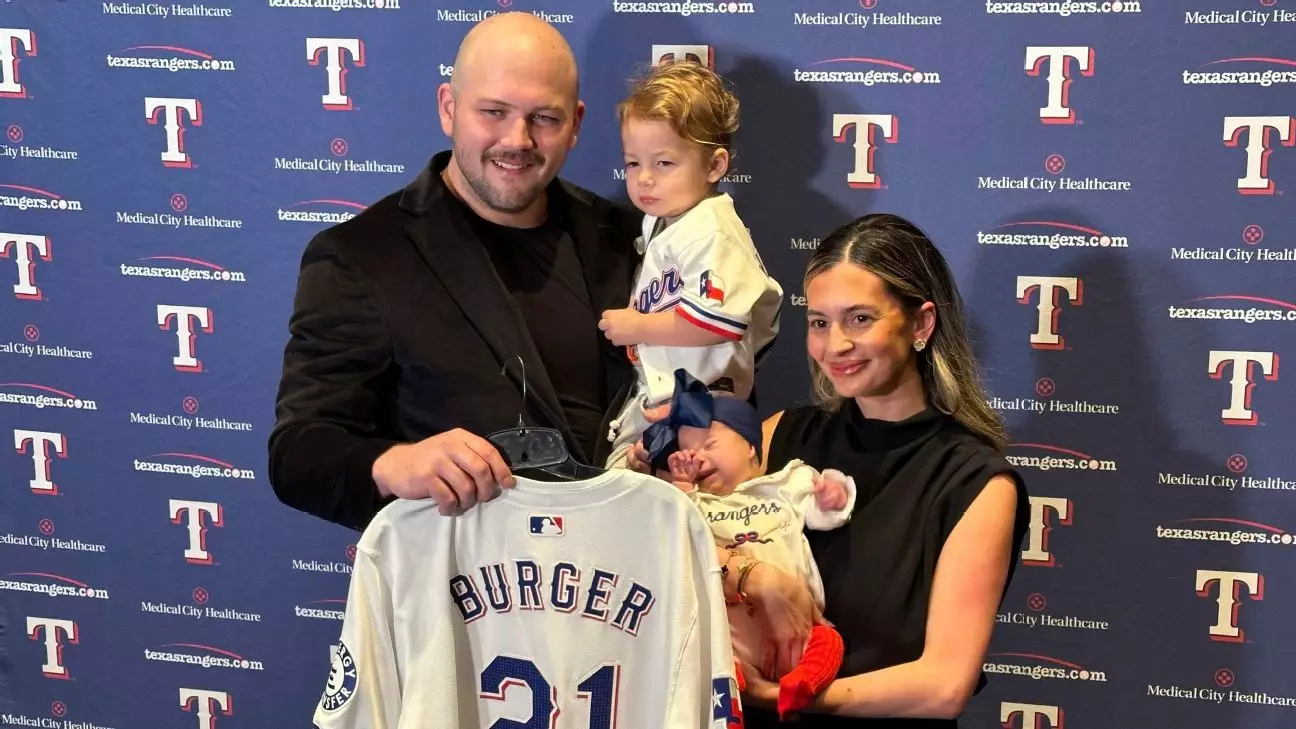When Jake Burger donned the number 21 for the Texas Rangers, it became more than just a jersey; it transformed into a beacon of hope, awareness, and pride for his family and the Down syndrome community. Trisomy 21, the clinical term for Down syndrome, is recognized as a condition characterized by the presence of an additional chromosome, often leading to various cognitive and developmental challenges. By choosing to wear this specific number as a first baseman, Burger is leveraging the platform of professional baseball to foster greater understanding and support for those affected by Down syndrome.
Burger’s decision is rooted deeply in personal experience. During a press event, he articulated a sentiment many athletes often overlook: the significance of numbers beyond their athleticism. For him, No. 21 embodies both a personal narrative and a broader call for support. “For me, it’s trying to spread awareness and try and get the word out about Down syndrome,” he conveyed, emphasizing the importance of advocacy in his new role as a player and a father.
At the core of Jake Burger’s journey are his family members, who not only support him but have been pivotal in motivating his advocacy. During his first public appearance after being traded from the Miami Marlins, Burger was accompanied by his wife, Ashlyn, and their newborn daughter, Penelope. Penelope’s birth marked a significant turning point for the Burger family, as the challenges and joys of raising a child with Down syndrome became part of their everyday life.
In a poignant reveal, Burger explained how Ashlyn inspired him to choose No. 21, reflecting the unity in their journey. This number symbolizes their newfound identity as parents of a child with special needs. Such a decision transcends personal significance; it prompts questions about how society interfaces with individuals facing disabilities. The support for Down syndrome families is as crucial as the promotion of awareness, creating a network through which collective strengths can thrive.
With his newfound platform, Burger has shared aspirations to establish a foundation dedicated to assisting families impacted by Down syndrome. This initiative reflects a deeper commitment beyond personal representation—Burger and Ashlyn envision a community that fosters empowerment and education for others navigating similar challenges. “We’re really, really excited to push that forward and help as many families as we can,” he stated, highlighting a mission that resonates with countless others in the Down syndrome community.
The couple described their sentiment of being the “lucky few,” which gracefully illustrates the gratitude and joy they feel despite the hurdles they face. This perspective is essential, as it shifts the narrative from one of limitation to one of possibility. In a world where disabilities are often viewed through a lens of pity, Burger’s positive outlook serves as an encouraging reminder of the strength and resilience that exist within families who embrace such journeys.
As the season approaches, Burger faces the dual challenge of preparing for his role as a professional athlete while also being present for his daughter, who faces impending heart surgery. It’s a poignant reminder that life often poses difficult choices for dual identities: that of the athlete and the father. Burger’s declaration, “She’s the strongest little person I know,” resonates on multiple levels—not just as a son’s words of admiration for his daughter, but as a father’s devotion to be there when it matters most.
Moreover, the connection between Jake Burger and new teammate Joc Pederson deepens this narrative of unity. Pederson’s own experiences with a sibling who has Down syndrome can create an empathetic bond that elevates the importance of representation in professional sports. The shared understanding between these two athletes is indicative of the relationships and community that form around shared experiences, enhancing their commitment to advocacy.
Jake Burger’s journey with the Texas Rangers serves as a powerful narrative about the intersections of sports, family, and social responsibility. Wearing No. 21 is a symbolic gesture filled with personal meaning that transcends the usual confines of an athlete’s identity. By focusing on awareness and outreach, Burger champions a cause that is close to his heart, embodying a new kind of leadership that integrates advocacy with professional success, thereby inspiring others to step into their voices and stories.


Leave a Reply